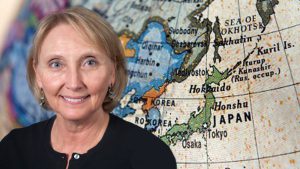August 21, 2012
By Sarah Certa ’10
Fulbright Scholar Ruth Forsythe explores the rich literary traditions of Okinawa.

Forsythe will spend her Fulbright term on Okinawa, one of Ryukyu Islands about 400 miles south of Japan’s mainland.
When Winona State University English professor Ruth Forsythe received news that she’d been granted a Fulbright Scholarship to teach for five months in Japan, she imagined the experience would be an extended revisit to her homeland. Although her parents are originally from the Midwest, Forsythe was born and raised in Japan. She moved to the United States to attend college when she was 18, where she studied English at St. Olaf College and went on to earn her master’s and PhD in comparative literature from the University of Minnesota. She has since visited Japan many times, but never for an extended period, and so her decision to apply for the Fulbright was both out of “personal interest and academic enthusiasm.”
Forsythe was surprised, though, when she discovered her placement was Okinawa, a subtropical island that lies more than 400 miles south of Japan’s mainland. Although unfamiliar with the island, Forsythe says she’s become intrigued by Okinawa’s multicultural atmosphere, something the mainland doesn’t offer. Because her main area of study focuses on cultural displacement and hybridity, Forsythe says her placement in the culturally rich Okinawa “makes sense from an academic standpoint.”
Beginning in September Forsythe will teach English courses at the University of the Ryukyus, where she plans to discuss topics that include American pop culture, politics of identity and place in literature, as well as how Asian-American literature has been received, or perhaps misperceived, in the west.
“I’m interested in how Japanese students will respond to texts I’ve used at Winona State,” she says. “I’m interested in what young people now in Japan are thinking about literature and how they are using it in their lives.”
Forsythe has always been drawn to literature as “a wonderful way” to understand how people think, and she says she’s especially interested in the connection between cultural values and aesthetic and how they guide narrative structure. “I knew early on I wanted to do more with comparative literature, to understand the different ways writers tell their stories,” she says. Her visit to Japan will also be an excellent opportunity to witness firsthand how cultural values shape the ways in which readers approach a story.
Cultural values influence teaching and learning styles, too. Although Forsythe is fluent in Japanese, she will have to contextualize material for students and take into consideration, for instance, that Japanese classrooms utilize lecture over interactive strategies. Reading levels in Japan differ, and, unlike American students, Japanese students are not expected to come to class having completed preliminary critical reading.
Preparing to teach in Japan is perhaps one of the greatest challenges, but it’s also something Forsythe enjoys. “I like to think about what I can do to make the material accessible to students, how I can adjust both the content and the way I teach.”
Forsythe hopes to expand her own reading experience beyond the Japanese canon she is so familiar with and into Okinawa’s rich literary tradition. Because Okinawans find themselves as a minority of the dominant mainland, their writers don’t receive the same exposure as some of Japan’s other great literary figures. Forsythe is excited to explore some of these writers and, especially, to raise awareness of these texts by integrating them into her WSU classes when she returns.
“I always try to bring in material students are not familiar with,” she says. “One of the major reasons I applied for the Fulbright is so I can bring my experiences back to my Winona State classrooms, to expand their knowledge and remind students that we do read texts differently based on our cultural backgrounds.”
When she’s not in the classroom, Forsythe plans on devoting time to literary research projects as well as learning more about Japanese literature from her colleagues. She hopes to find herself in “a community with connections,” and to discover the tastes, sights, and sounds of the island. Okinawans are known to be among the most healthy and long-lived people on the planet. “Maybe my time there will even add on a few years to my life,” Forsythe jokes.
In addition to having time for research and learning the ways of the Okinawan culture, Forsythe says she most looks forward to interacting with the students. She hopes that, through the vehicle of literature, she can encourage her students to connect with the imaginations of cultures that receive limited exposure.
“My hopes for my Japanese students are my hopes for all my students: that they will read more broadly and appreciate literature and all it can do for us.”

